Three American racing legends – Carroll Shelby, Briggs Cunningham and Al Momo – joined forces in 1963, resulting in an exotic Maserati sports racer powered by Ford.
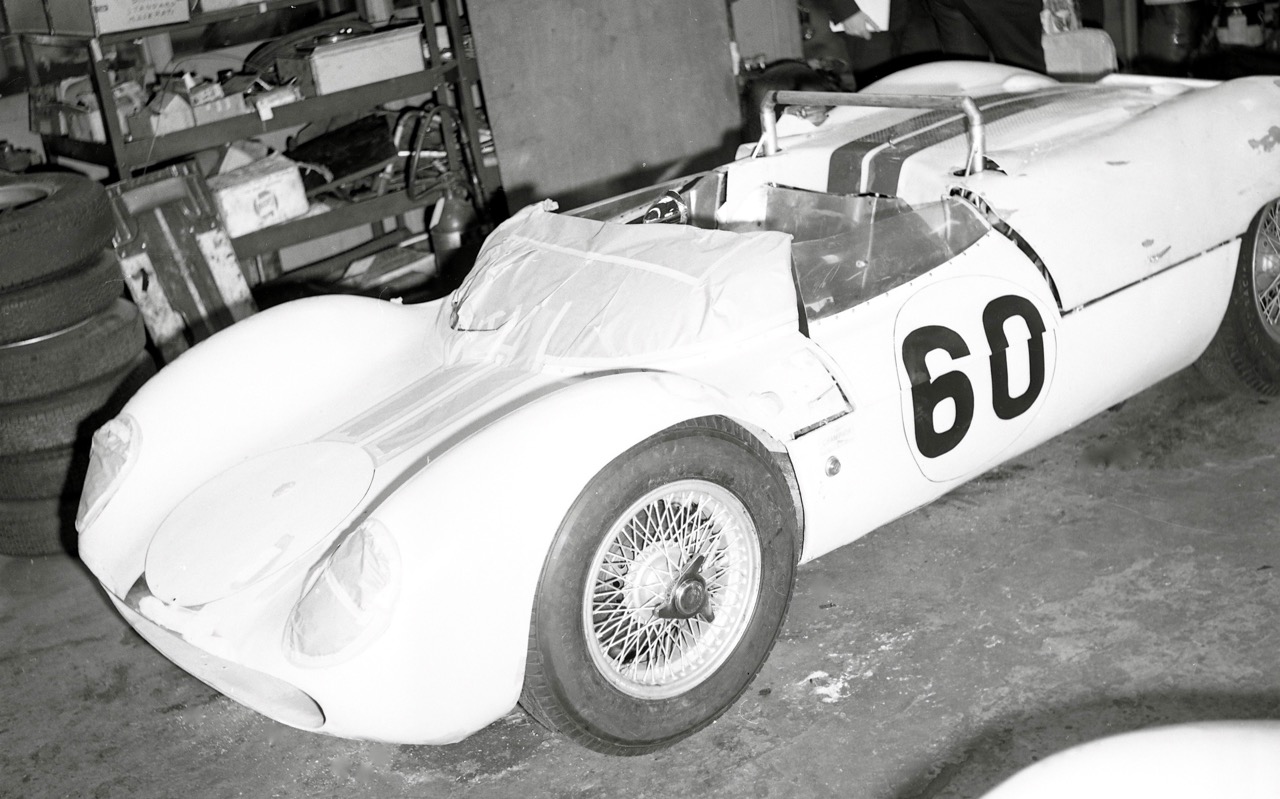
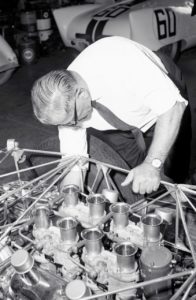 Transplanting American V8 engines into imported sports racers gained popularity in the early-mid 1960s. American V8s were often inexpensive, simple to modify and maintain, and in many cases lighter than imports. Most importantly, they produced maximum horsepower and torque at considerably lower and more useable rpm for improved performance and durability. COBRA IN A BIRDCAGE! Is a perfect example.
Transplanting American V8 engines into imported sports racers gained popularity in the early-mid 1960s. American V8s were often inexpensive, simple to modify and maintain, and in many cases lighter than imports. Most importantly, they produced maximum horsepower and torque at considerably lower and more useable rpm for improved performance and durability. COBRA IN A BIRDCAGE! Is a perfect example.
Ford’s lightweight 260-289 V8, which was elevated to International status by Carroll Shelby’s Cobras, caught the attention of Alfred Momo and Briggs Cunningham in 1963. Momo, right, managed Briggs Cunningham’s racing team and operated a full sports car and racing services facility in New York City. Cunningham built sports cars and racecars in 1951-1955, took Corvettes to Le Mans in 1960 and was the highest-profile racing team owner-driver in the U.S in the late-1950s and early-1960s.
In 1963 Cunningham spent a lot of time racing Momo-prepared Maserati Tipos, also known as Birdcages because of their unique triangulated small-diameter tubular chassis construction. The original Tipo chassis weighed just 66 pounds and resembled a large birdcage. It was originally fitted with a three-liter DOHC V12 engine. While considered state-of-the-art because of unique space-frame construction, they were plagued with suspension failures leading to serious handling and reliability issues. At the time Maserati was cash-starved, negatively affecting racecar development.
Both Cunningham and Momo were aware of Shelby’s success with Ford-powered Cobras and decided to bring him in while Momo was rebuilding one of two Maserati Tipo 64 Birdcages (#64.002). It had been built in 1962 as a Tipo 63 and later returned to Italy for chassis updates, rear suspension change, weight reduction and relocation of the engine for better weight distribution.
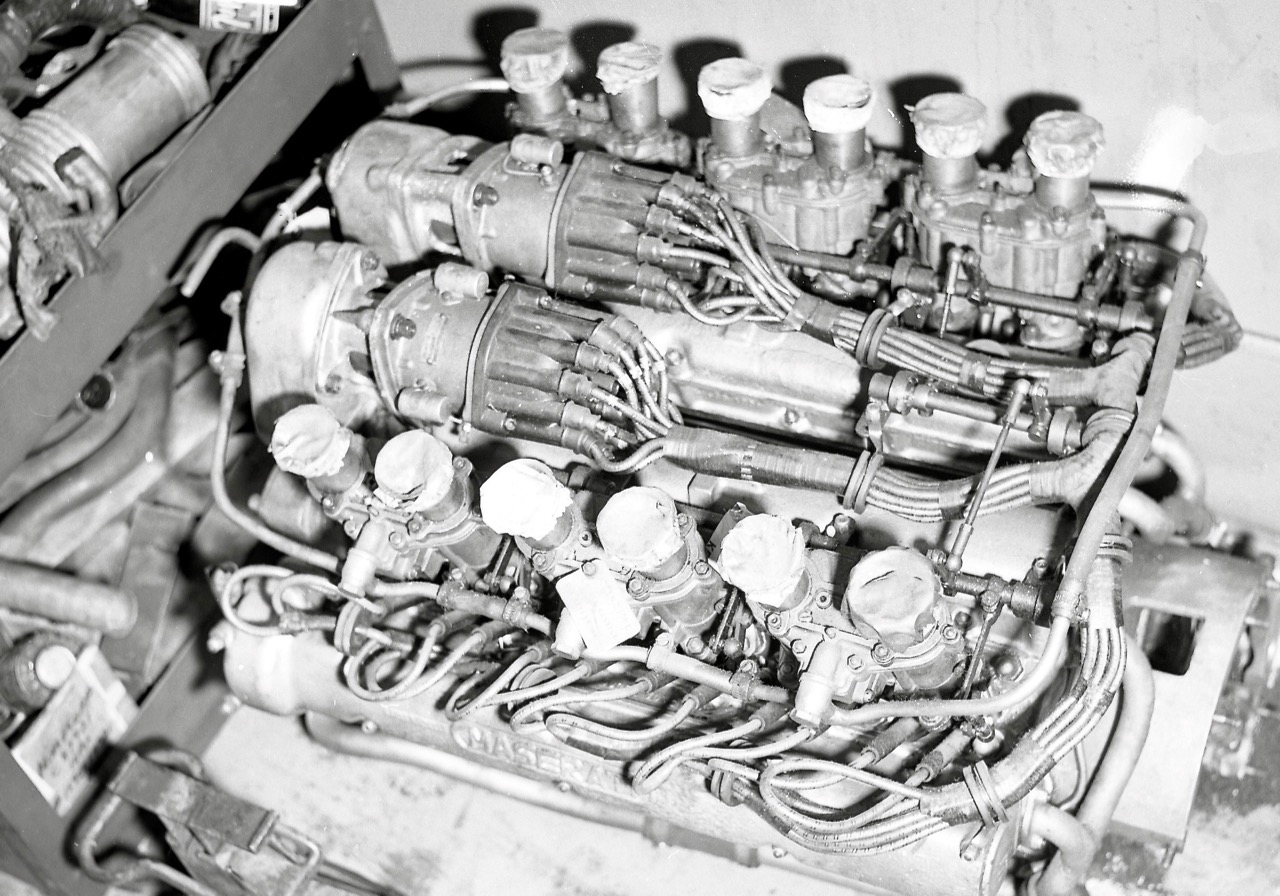 Its fully independent rear suspension was replaced with a De Dion setup located with its own tubular framework. Power came from a 60-degree 183-cubic-inch V12 with four cams and six Weber 35-DCV carburetors. Output was 320 horsepower at 8,200 rpm. This is the same engine used by Maserati in 1957 in its Formula One 250.
Its fully independent rear suspension was replaced with a De Dion setup located with its own tubular framework. Power came from a 60-degree 183-cubic-inch V12 with four cams and six Weber 35-DCV carburetors. Output was 320 horsepower at 8,200 rpm. This is the same engine used by Maserati in 1957 in its Formula One 250.
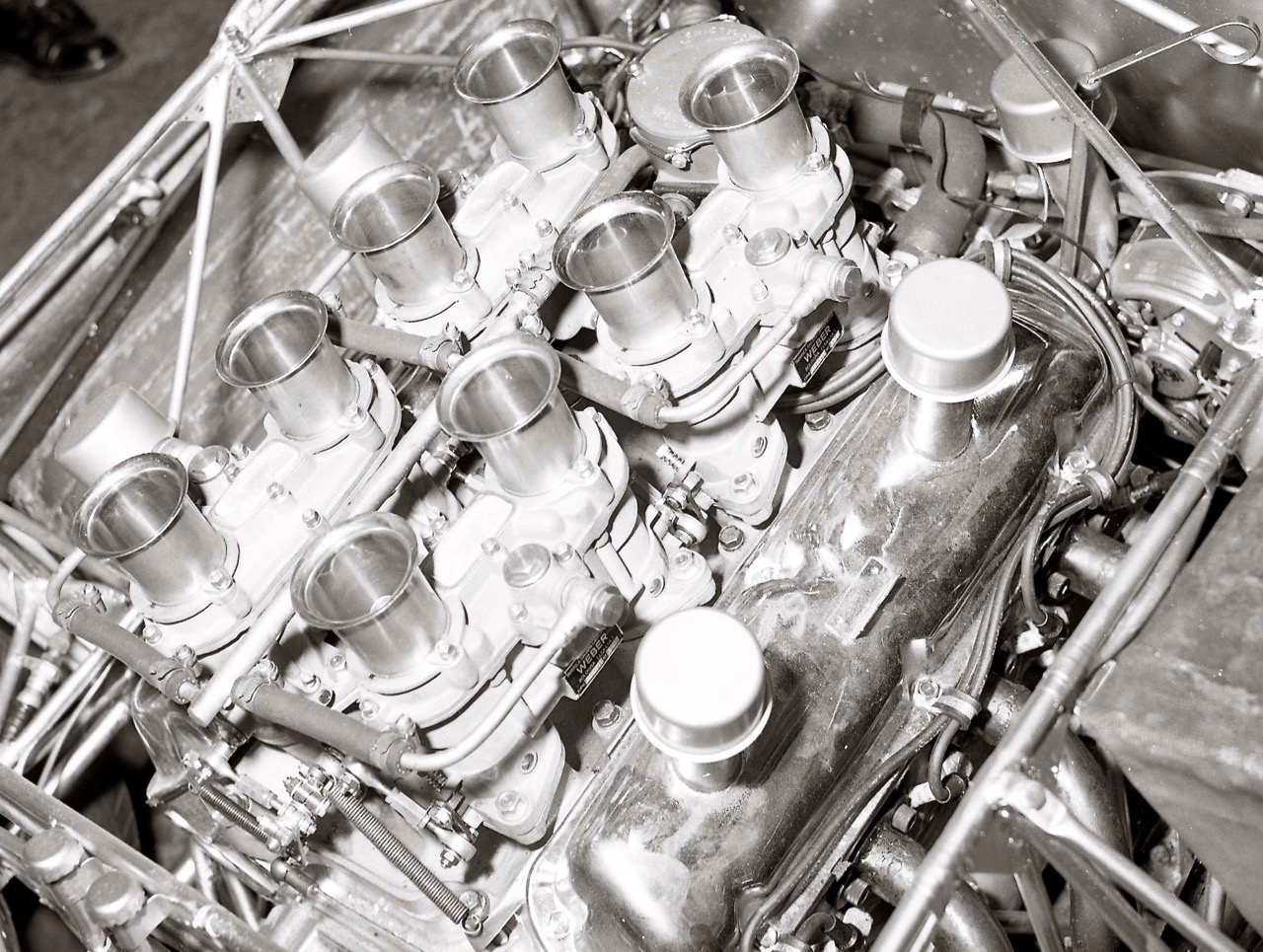 Shelby suggested a 289-cubic inch Cobra competition engine that would put out more useable horsepower and torque at more than 1,000 rpm less than the V12. I spent a day in August 1963 at Momo Competition after the Shelby-Ford 289, fitted by Al Momo with four Weber 4610-M1 carburetors, was installed and fired up. The 289’s headers were plumbed into rear exit quad megaphones. It had an incredible bark – much more raucous sounding than a competition Cobra. Rated at 340-horsepower at 7,000 rpm, the engine was fitted with ported and polished heads like the ones used on FIA Cobras, a Motorola alternator and Spalding Flamethrower ignition. It was shipped with an aluminum Cobra-Weber intake manifold sans carburetors, and a custom nine-quart oil pan.
Shelby suggested a 289-cubic inch Cobra competition engine that would put out more useable horsepower and torque at more than 1,000 rpm less than the V12. I spent a day in August 1963 at Momo Competition after the Shelby-Ford 289, fitted by Al Momo with four Weber 4610-M1 carburetors, was installed and fired up. The 289’s headers were plumbed into rear exit quad megaphones. It had an incredible bark – much more raucous sounding than a competition Cobra. Rated at 340-horsepower at 7,000 rpm, the engine was fitted with ported and polished heads like the ones used on FIA Cobras, a Motorola alternator and Spalding Flamethrower ignition. It was shipped with an aluminum Cobra-Weber intake manifold sans carburetors, and a custom nine-quart oil pan.
Unlike previous Birdcages that Cunningham had raced, COBRA IN A BIRDCAGE! was the first to utilize a De Dion rear suspension with a five-speed gearbox and an interchangeable Fifth gear. To adapt the Cobra engine, Momo chopped the Ford bellhousing and utilized a Maserati flywheel and clutch. Clutch and throttle, linkage were converted to hydraulic-assist utilizing slave cylinders.
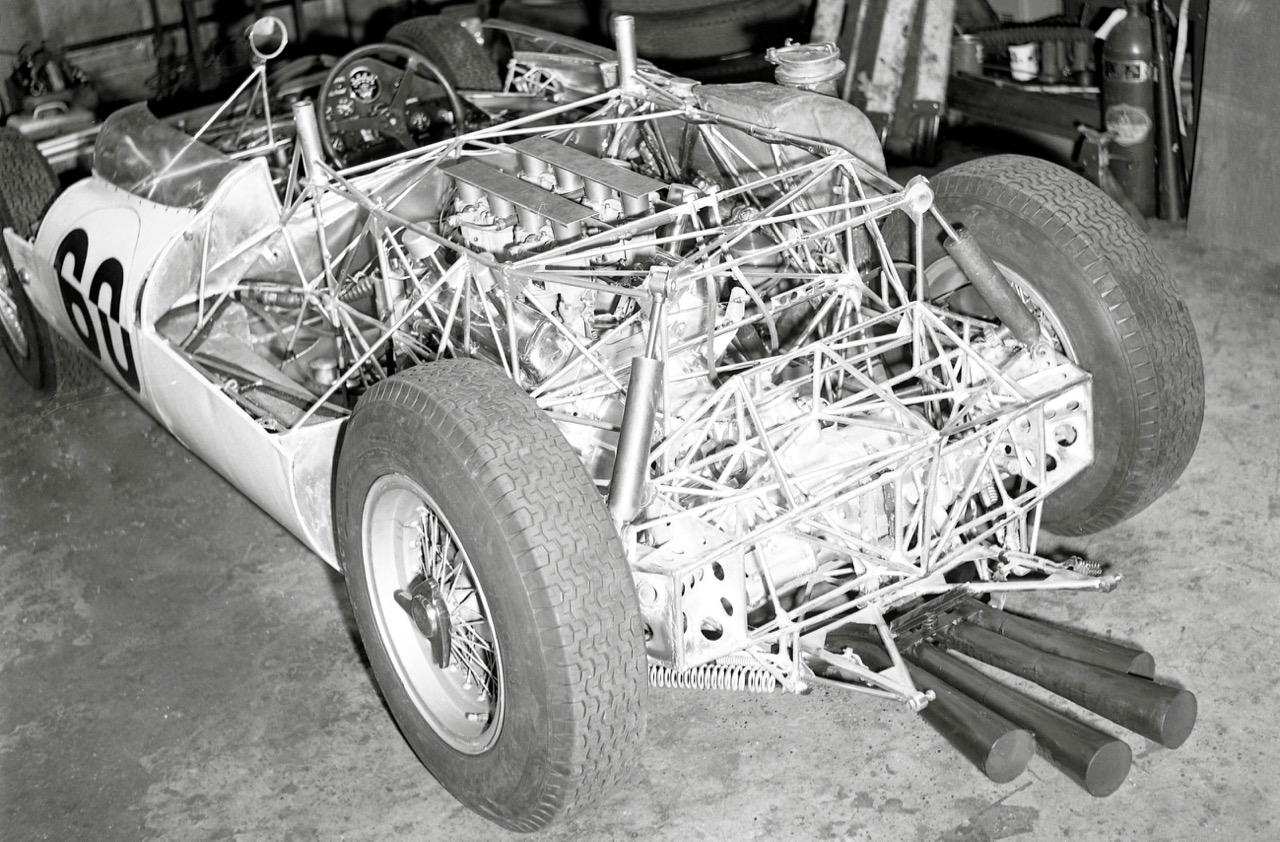 To compensate for the new powerplant, adjustable Armstrong shocks and beefier 42-mm knock-off hubs were added. An aluminum cross-flow radiator, aided by small vents in the aluminum rear body panels, cooled the fan-less engine. Ready to race, the Ford-engined Maserati Birdcage weighed in at 1,400 pounds, exactly one pound less than with the V12!
To compensate for the new powerplant, adjustable Armstrong shocks and beefier 42-mm knock-off hubs were added. An aluminum cross-flow radiator, aided by small vents in the aluminum rear body panels, cooled the fan-less engine. Ready to race, the Ford-engined Maserati Birdcage weighed in at 1,400 pounds, exactly one pound less than with the V12!
With the help of Willem Oosthoek, author of Birdcage to Supercage and Larry Berman, Cunningham historian, we were able to track the Ford-powered Birdcage’s racing history. The first time out with Walt Hansgen driving, #64.002 took a Third overall at the Watkins Glen SCCA Nationals on August 24, 1963. Primary drivers were Cunningham, Augie Pabst and Paul Richards. Dr. Dick Thompson also spent some seat time in Tipo #64.002.
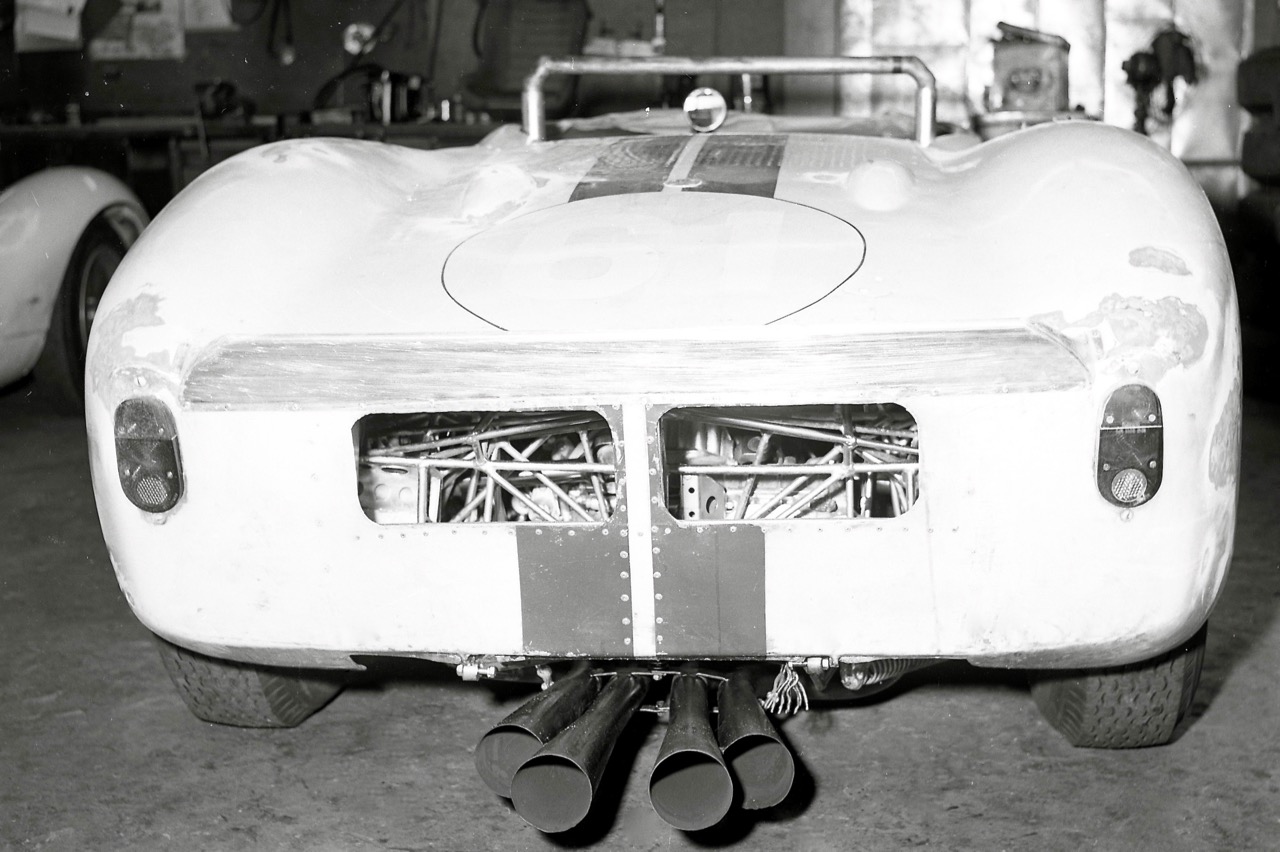 Over the years, ownership of #64.002 passed from Cunningham to Pabst and then to Ham Vose. It competed at the Bridgehampton Double 500, Los Angeles Times GP at Riverside and many regional events in 1963. The last big race it ran was the USRRC event at Augusta. In later years, still fitted with the Shelby Cobra engine, it was on display at the Blackhawk Collection.
Over the years, ownership of #64.002 passed from Cunningham to Pabst and then to Ham Vose. It competed at the Bridgehampton Double 500, Los Angeles Times GP at Riverside and many regional events in 1963. The last big race it ran was the USRRC event at Augusta. In later years, still fitted with the Shelby Cobra engine, it was on display at the Blackhawk Collection.
COBRA IN A BIRDCAGE! originally appeared in FORD TOTAL PERFORMANCE, https://www.amazon.com/Ford-Total-Performance-Legendary-High-Performance/dp/0760348588
